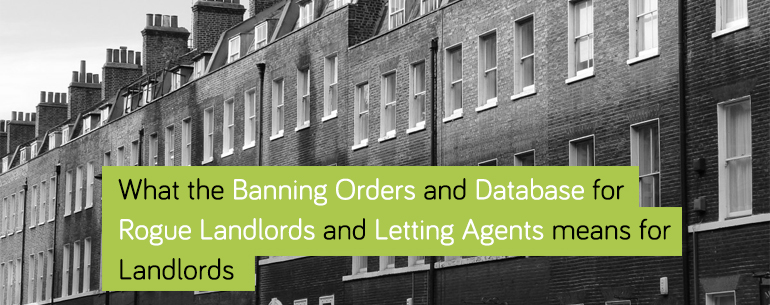
Tomorrow (6 April) introduces the enforcement of banning orders for rogue landlords and letting agents, and the introduction of a database logging their transgressions.
Committing an offence such as an unlawful eviction or harassment of a tenant, or failing to comply with an improvement notice are examples of actions that could lead to a landlord receiving a banning order. A ban could last for as a year or longer, sometimes indefinitely.
Those who have received a banning order will find it more difficult to sweep such information under the carpet with the added introduction of the database.
This database was originally announced as part of the Housing and Planning Act 2016, and is now finally coming into effect. It will provide information on any landlord or letting agent who has ever been served a banning order, or has been convicted for an offence outlined by the order.
A similar database has already been instated in London. Their Rogue Landlord and Agent Checker was the first such database in the country, and has been used to ‘name and shame’ any landlords and letting agents who have been successfully prosecuted or have faced civil enforcement action for housing offences. This database is accessible to all renters, allowing them the opportunity to do a background check before signing any rental agreements.
However, this database that will be put into place as part of changes suggested by the Housing and Planning Act 2016 will not be publicly available. It will only be accessible by the Department for Communities and Local Government (DCLG) and local authorities. It therefore seems to be that this database will be more for the use of local authorities, allowing them to keep track of rogue landlords and letting agents.
With the database out of the public’s eye however, it means no one will be able to see it and therefore letting agents and landlords who are on the list can continue operating with impunity. This appears to be a pointless exercise; if the list were made public – like the equivalent for estate agents – rogue agents and landlords would ushered out of the market for good, which is only a good thing for legitimate and caring landlords and letting agents.
Along with the banning orders and database, the Housing and Planning Act 2016 has introduced other suggestions. Since April 2017, a rogue landlord may now receive civil penalties of up to £30,000. There is also now an extension of Rent Repayment Orders to cover illegal eviction, breach of a banning order or failure to comply with a statutory notice.
As a landlord, it continues to be critical to remain up to date with the correct legal proceedings and management legislation for properties. This will minimise any chances of being put on any such database that even though it may not be publicly accessible, may still lead to negative consequential actions taken against you down the line.
As ever, it also pays to ensure you’re using a legitimate letting agent. If as a landlord you are ever in doubt about your current letting agent and suspect they may be acting against the order, and are considering a new agent to thoroughly and correctly manage your property, please do get in touch.
A full list of offences that fall within the banning order can be viewed on the legislation.gov website.







